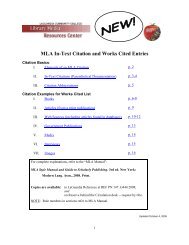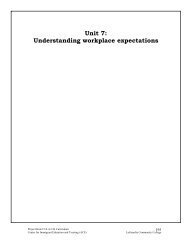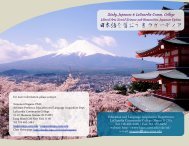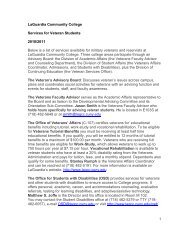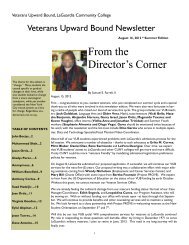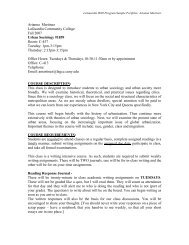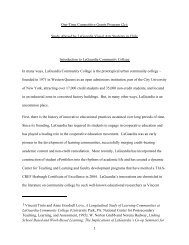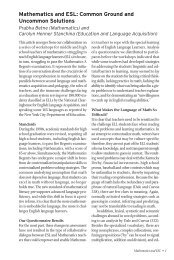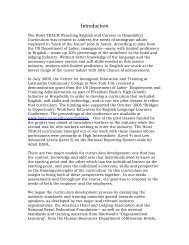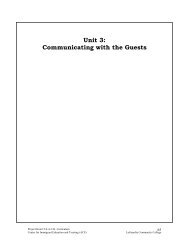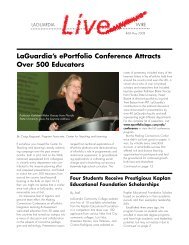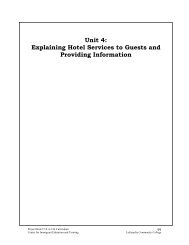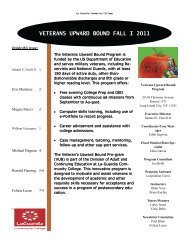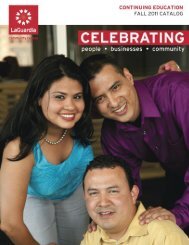COURSE INDEX - LaGuardia Community College
COURSE INDEX - LaGuardia Community College
COURSE INDEX - LaGuardia Community College
Create successful ePaper yourself
Turn your PDF publications into a flip-book with our unique Google optimized e-Paper software.
Mathematics, Engineering, and Computer Science Department<br />
MAC289 Computer Technology Project Lab<br />
2 credits; 2 hours<br />
This course reinforces the student’s concepts of digital circuit-board<br />
fabrication for computer and communication devices through the<br />
construction of projects. Topics include: lab safety, reading<br />
schematic diagrams, PC board layout design and construction, components<br />
soldering and wirewrapping. The student will also learn the<br />
techniques of troubleshooting the devices using the instruments provided<br />
by the laboratory. The projects will vary. The student should<br />
expect to pay for additional materials for this course.<br />
Prerequisite: MAC261 or MAC292<br />
MAC291 Computer Logic, Design and Implementation I<br />
4 credits; 5 hours (3 lecture, 2 lab)<br />
This course will teach students how a computer logic statement is<br />
converted into an actual circuit. Using binary notation and<br />
Boolean algebra, the student will analyze switching networks of<br />
logic gates. The circuits which are mathematically described will<br />
then be translated into wiring diagrams and implemented on logic<br />
trainers and/or prototype boards. The student should expect to<br />
pay for additional materials for this course.<br />
Prerequisite: MAC241, MAT241<br />
MAC292 Computer Logic, Design and Implementation II<br />
4 credits; 5 hours (3 lecture, 2 lab)<br />
Students will learn to analyze sequential networks. The use of flipflops<br />
in circuits, such as binary counters, serial adders, parallel<br />
multipliers and code converters will be studied. Wave form<br />
analysis will be done in the lab using oscilloscopes and logic<br />
devices. The student should expect to pay for additional materials<br />
for this course.<br />
Prerequisite: MAC291, MAT241<br />
MAC293 Computer Repair and Network Maintenance<br />
4 credits; 5 hours (3 lecture, 2 lab)<br />
This course will provide students with the knowledge needed to<br />
diagnose and repair stand-alone and networked personal computers.<br />
The student will learn about hardware, including disk<br />
drives, mainboards, video boards, network interface cards and<br />
modems. Students will learn how to set up, diagnose, and repair<br />
network connections, servers and workstations. Students will<br />
work with testing equipment such as oscilloscopes, patch boxes,<br />
LAN testers, and wiring tools. General software diagnostic tools<br />
will be used. The student should expect to pay for additional<br />
materials for this course.<br />
Prerequisite: MAC231 or MAC232 or MAC233 or MAC292<br />
MAC295 Computer Architecture<br />
4 credits; 5 hours (3 lecture, 2 lab)<br />
This course is intended for students who are in the computer<br />
science program or for students interested in developing a background<br />
in hardware concepts. Topics covered include number systems,<br />
logic circuits, arithmetic circuits, flip-flops, registers,<br />
memories, sample designs of simple computers and an introduction<br />
to microprogramming. The student should expect to pay for<br />
additional materials for this course.<br />
Prerequisite: MAC196 or MAC265, MAT200 or MAT241<br />
Engineering Science<br />
MAE100 Computer-Aided Design<br />
4 credits; 4 hours<br />
This course introduces the student to AutoCAD’s friendly pulldown<br />
menus as a tool to create graphical representations of<br />
objects. The course covers introduction of dimensioning systems,<br />
fundamentals of orthographic views of real-world objects, and<br />
basic two-dimensional drafting techniques. The course includes<br />
the creation of three-dimensional objects and their modification<br />
by changing the rendering options, material and lighting properties.<br />
Views of assemblies and animations are also considered.<br />
Pre- or Corequisite: CSE095, ENA/ENG/ESA099/ENC101,<br />
MAT096<br />
MAE101 Engineering Lab 1<br />
1 credit; 3 hours (lab)<br />
This is the first of two engineering laboratory courses. Students<br />
meet once a week and are introduced to engineering design<br />
through hands-on laboratory work using computer applications.<br />
They are taught how to carry out basic structural analysis; in particular,<br />
they are introduced to programming a robot to perform a<br />
specific task. Additionally, they work in groups on design projects<br />
and are expected to use computers for documentation, for data<br />
analysis, and for maneuvering the robots.<br />
Prerequisite: MAT200<br />
MAE103 Engineering Lab 2<br />
2 credits; 3 hours (lab)<br />
This course presents selected mathematical concepts and techniques<br />
of engineering science, using Matlab. It reinforces the<br />
importance of qualitative and quantitative reasoning, and introduces<br />
computer-based methods for verifying analytic reasoning<br />
and experimental results.<br />
Prerequisite: MAT201<br />
MAE107 Manufacturing Processes<br />
3 credits; 2 Classroom hours/ 3 Lab Hours<br />
The goal of this course is to introduce students to general concepts<br />
in manufacturing. Different materials, tools and fabrication<br />
processes will be presented, with emphasis on the lathe and drilling,<br />
milling and grinding machines. Welding materials, techniques and<br />
symbols are introduced. Programming of Computerized Numerical<br />
Control (CNC) machines is also included, complemented with<br />
robotic programming for flexible manufacturing of components.<br />
Prerequisite: HUA104<br />
Pre- or Corequisite: ENC/ENG101, MAE100<br />
MAE211 Engineering Mechanics: Statics<br />
3 credit; 3 hours<br />
This course is designed to introduce students to the theory and<br />
applications of engineering mechanics – statics. Topics to be covered<br />
include equivalent systems of forces, resultants, distributed<br />
forces, equilibrium of rigid bodies, centroids, centers of gravity,<br />
fluid statics, moments of inertia and friction. Analysis of frames<br />
and machines, forces in beams, internal stresses and stability will<br />
160



